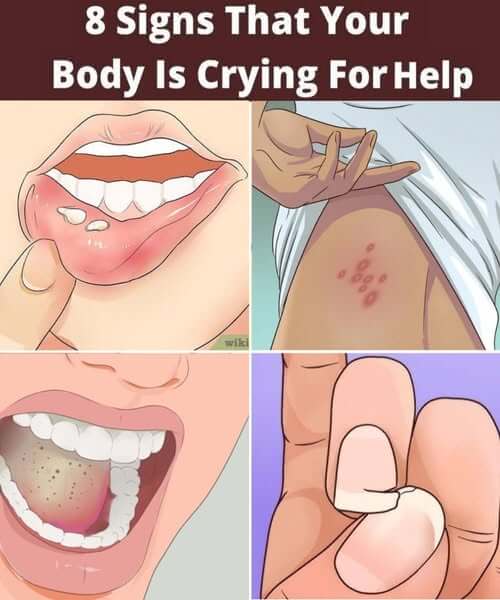8 Signs That Your Body Is Crying for Help
Introduction: Listening to Your Body’s Signals
Your body is an incredible system that constantly communicates with you. Sometimes it whispers through mild symptoms—fatigue, dry skin, or changes in the mouth—and other times it shouts with more obvious discomfort. The problem is, many of us ignore these early signals, dismissing them as “normal” or temporary.
But small changes can be red flags for nutrient deficiencies, stress, circulation problems, or underlying imbalances. The good news? If you notice them early, you can take action to restore balance and protect your long-term health.
Here are 8 key signs your body may be crying for help—what they might mean and how to support your body naturally.
1. Frequent Mouth Ulcers
What It Might Mean:
- Vitamin B12, iron, or folate deficiency
- Low immunity or stress-induced inflammation
Natural Support:
- Eat B12-rich foods: fish, eggs, fortified cereals
- Add leafy greens, lentils, and citrus fruits
- Manage stress with quality sleep and relaxation
2. Cracks at the Corners of the Mouth
What It Might Mean:
- Iron or zinc deficiency
- Dehydration
- Fungal infections (if persistent)
Natural Support:
- Drink more water
- Eat zinc-rich foods: pumpkin seeds, chickpeas
- Apply natural balm; consult a doctor if it worsens
3. A Swollen or Red Tongue
What It Might Mean:
- Vitamin B complex deficiencies (B2, B3, B6, B12)
- Iron-deficiency anemia
- Food sensitivities or mild allergic responses
Natural Support:
- Eat lean meats, dairy, and whole grains
- Boost iron intake with spinach, beans, lentils
- Track food triggers
4. Weak or Brittle Nails
What It Might Mean:
- Calcium or iron deficiency
- Thyroid imbalance
Natural Support:
- Add dairy, yogurt, and leafy greens
- Combine iron-rich foods with vitamin C
- Include iodine-rich foods like seaweed and eggs
5. Numbness or Tingling in Hands and Feet
What It Might Mean:
- Vitamin B12 deficiency
- Poor circulation
- Nerve issues (may require professional care)
Natural Support:
- Eat more B12: salmon, eggs, dairy
- Move often—avoid long periods of sitting
- Exercise to improve blood flow
6. Persistent Dry Skin
What It Might Mean:
- Dehydration
- Omega-3 deficiency
- Thyroid dysfunction
Natural Support:
- Drink 6–8 glasses of water daily
- Eat flaxseeds, walnuts, and fatty fish
- Moisturize with coconut or olive oil
7. Foot Pain or Unusual Toe Shape
What It Might Mean:
- Circulation issues
- Arthritis or inflammation
- Nutrient deficiencies affecting bones
Natural Support:
- Wear well-fitting, supportive shoes
- Stretch and massage feet
- Eat calcium, magnesium, and vitamin D-rich foods
8. Chronic Fatigue
What It Might Mean:
- Thyroid dysfunction
- Iron-deficiency anemia
- Adrenal fatigue or stress overload
Natural Support:
- Create a calming bedtime routine
- Eat balanced meals with protein and whole grains
- Reduce stress through nature walks, yoga, or breathwork
- Support thyroid health with selenium, iodine, and B vitamins
How to Support Your Body Naturally
- Eat a nutrient-rich diet: Aim for variety—vegetables, fruits, whole grains, lean proteins, healthy fats
- Stay hydrated: Drink water consistently throughout the day
- Move and rest: Balanced physical activity and restful sleep keep hormones and circulation in check
- Listen to persistent symptoms: Don’t ignore signals that linger or worsen—early action is powerful
Q&A Section
Q1: Can I fix these issues with diet alone, or do I need supplements?
A: Many minor deficiencies can be corrected with a consistent, nutrient-dense diet. However, if you’re severely deficient (especially in B12, iron, or vitamin D), supplements may be necessary. Always get bloodwork and consult a healthcare provider before starting high-dose supplements.
Q2: How long does it take to feel better after improving nutrition?
A: Some improvements, like energy and skin hydration, may be felt in 1–2 weeks. Others, like nail strength or chronic fatigue, may take a few months of consistent care. Be patient and track your symptoms over time.
Final Thoughts: Don’t Ignore Your Body’s Messages
Your body doesn’t lie—it sends signals to help you stay in balance. By learning to recognize these 8 signs, you empower yourself to make changes early and avoid more serious complications later.

